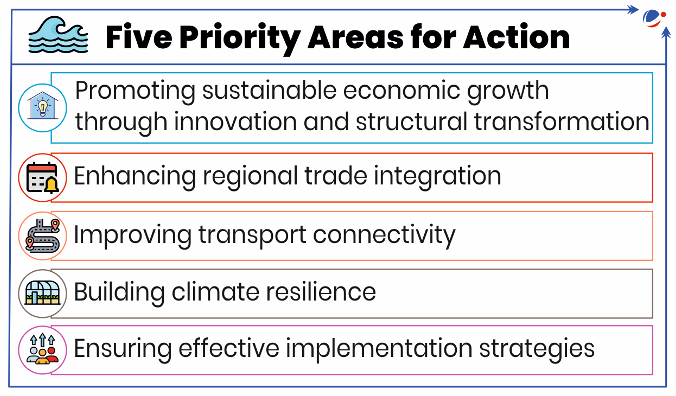Programme of Action for Landlocked Developing Countries for Decade 2024-2034
UN General Assembly adopted Programme of Action for Landlocked Developing Countries for Decade 2024-2034
- It builds on Vienna Programme of Action (2014-2024) & Almaty Programme of Action (2003), which laid groundwork for addressing challenges faced by Landlocked Developing Country (LLDCs).
- It identifies 5 priorities (refer Infographic) & sets various targets under it.

Key Targets
- Boost labour productivity & job opportunities across all sectors by 50% by 2034.
- Provide support to develop special economic zones, industrial parks, etc.
- Reduce/eliminate arbitrary & unjustified non-tariff barriers & double their global merchandise exports by 2034.
- Effective implementation of WTO Agreement on Trade Facilitation in all LLDCs.
- Reduce disaster risk in LLDCs through full implementation of Sendai Framework for Disaster Risk Reduction 2015– 2030.
About (LLDCs)
- Landlocked countries are countries that do not have direct access to the sea. There are 32 LLDCs with a population of about 570 million.
- Liechtenstein & Uzbekistan are doubly landlocked countries (surrounded by other landlocked countries).
Challenges faced by LLDCs
- Hurdles in Trade: Relying on transit nations, leads to higher trade costs, delays & reduced competitiveness in global markets.
- Slower Economic Growth: Due to limited trade & export opportunities,reduced FDI etc.
- Global merchandise exports from LLDCs accounts for just 1.1% of total global exports (2022).
- Tags :
- Almaty Programme of Action
- Landlocked Developing Countries
- Vienna Programme of Action
Articles Sources
SMILE Program
India and Asian Development Bank (ADB) recently signed a $350 million policy-based loan under the second subprogram of SMILE (Strengthening Multimodal and Integrated Logistics Ecosystem) program.
About SMILE Program
- It is a programmatic policy-based loan (PBL) by ADB to support the government of India to undertake wide ranging reforms in the logistics sector.
- Objective
- To strengthen the institutional and policy framework for inter-ministerial coordination and planning for incentivizing private sector participation in multimodal logistics projects (MMLPs)
- To improve efficiencies in external trade logistics and encourage the use of smart and automated systems for improved service delivery.
- Tags :
- SMILE Program
Articles Sources
Network Readiness Index (NRI) 2024
The 2024 edition of the Network Readiness Index (NRI) has officially launched.
- The theme of this year is “Building a Digital Tomorrow: Public-Private Investments and Global Collaboration for Digital Readiness.”
- India climbed 11 ranks, securing the 49th position in NRI 2024.
- The report maps the network-based readiness landscape of 133 economies based on their performances in four different pillars: Technology, People, Governance, and Impact.
- It is co-published by Portulans Institute and Saïd Business School, University of Oxford.
- Tags :
- Network Readiness Index (NRI) 2024



